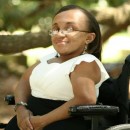- A
- A
- A

Awareness: knowledge that something exists, or understanding of a situation or subject at the present time based on information or experience.
Is having awareness about disability enough?
Short answer: No.
From the definition provided by the Cambridge Dictionary, awareness is superficial; it is merely being tuned into the fact that disability exists. For many of us, awareness of the world being populated with disabled people does nothing to raise consciousness about the barriers and discrimination we endure in an ableist society.
As someone with a rare condition, I do make people aware about my particular disability since it is not widely known; however, that knowledge of what my disability is does nothing to shatter the misperceptions and myths about what it is like to be a disabled person. Awareness about the specifics of what a particular disability entails (the medical descriptions and types) is just informational and does not scratch the surface of how having a disability impacts the livelihood and inclusion of that person.
Who benefits from awareness?
Short answer: Everyone but disabled people.
As an advocate, I see parent advocates, certain disability organizations, educators, and medical and social service professionals push the call for awareness so loudly that it drowns out the voices of actually disabled people like me. Our voices, as diverse as they are, should be at the forefront – you cannot talk about us without us being actively present. Your efforts, no matter the motivation, will continuously fall short when you exclude and do not make it a priority to center us in what you are doing. In fact, it should be us leading your efforts, and you learning how to be better allies/co-conspirators to our community. Unless you live this human experience, you will not understand the nuances that escapes the surface of your non-disabled comprehension of who we are and what we are fighting for and against each day.
Awareness will never be enough for us, and to fight us on that truth is quite telling. It is telling, because our experiences as disabled people is so easily taken over by those who are not disabled. That kind of takeover would be seen as unacceptable and insensitive if it occurred for other marginalized identities. However, due to the misbelief that disabled people need non-disabled people to “speak” for us and “declare” what is in our best interest, the takeover is not challenged as harshly. As I state in my advocacy work, authoritative knowledge (real-life experience) trumps acquired knowledge (scholarly understanding or eye-witnessed accounts). If you are not a disabled person, please stop pushing declarations like awareness campaigns when it is not what the collective community deems appropriate and effective.
What is it that the disabled community wants?
Short answer: Acceptance.
Acceptance: the act of agreeing to that person’s becoming a member of an organization or group, or to that person’s belonging to your group as an equal.
Why acceptance? Acceptance goes well beyond awareness. From the definition provided, it means to be seen as “belonging” and admitted into a group. That “group” would be the broader society. This would entail that society examine how it functions and is structured to oppress and exclude disabled people. It calls for society to recognize the various ways ableism harms us and prevents us from living without limits. Belonging as an equal in society proclaims that we have autonomy, our humanness is seen, and our voices are respected and heard over allies – parents, caregivers, professionals, educators – everyone. This visibility allows for the wrongs conducted against us to be held accountable and begin to be extinguished. Acceptance sees us as whole, well beyond our self- and medical diagnoses. Being seen through a holistic lens is what we want each day, and why awareness is truly insufficient to that becoming reality.
Acceptance is what we want, and we want it now. Awareness is not the consolation prize that we just need to be “grateful” for. There is no substitute for being seen and treated equally and having your existence validated. Acceptance or nothing at all – no other way around it.